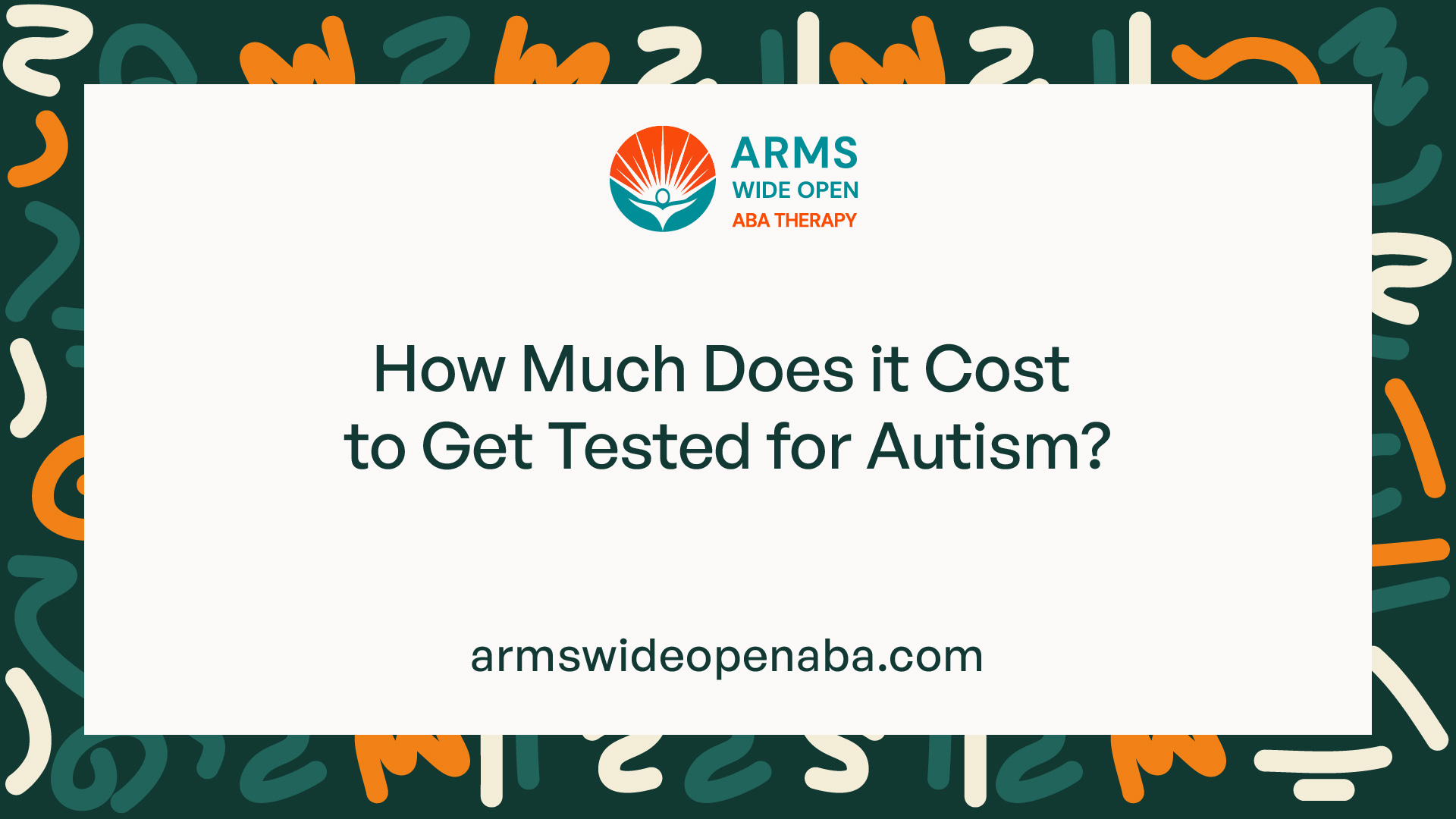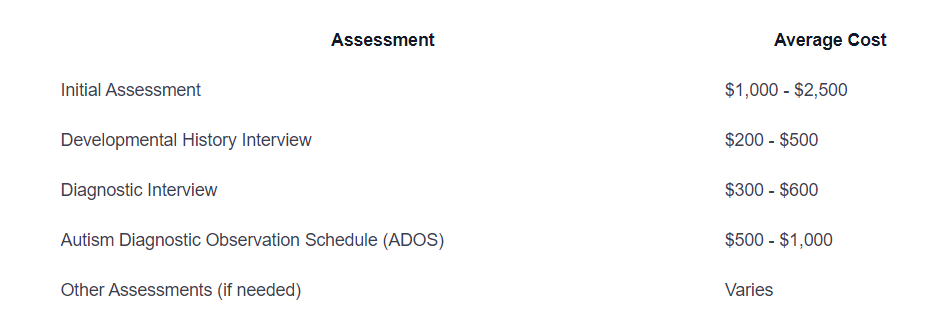How Much Does it Cost to Get Tested for Autism?
Unveiling the cost of autism testing: From assessments to insurance coverage, discover affordable options for early detection.

Understanding Autism Testing
Autism testing plays a crucial role in identifying and diagnosing autism spectrum disorder (ASD) in individuals. Early detection is key to providing appropriate interventions and support for those with ASD. Let's explore the importance of early detection and the process of autism testing.
Importance of Early Detection
Early detection of autism is vital as it allows for early intervention and support, which can significantly improve long-term outcomes for individuals with ASD. Identifying autism at an early age enables families and healthcare professionals to implement appropriate therapies and interventions tailored to the specific needs of the individual. Early interventions can help with language development, social skills, and behavioral management, promoting better overall functioning and quality of life.

Process of Autism Testing
The process of autism testing typically involves a comprehensive evaluation conducted by a team of professionals, including psychologists, pediatricians, and speech-language pathologists. This evaluation aims to assess various areas of development, communication, social interaction, and behavior.
The evaluation process may include:
- Developmental Screening: This initial screening helps identify potential developmental delays or red flags that warrant further assessment for ASD. It may involve questionnaires or checklists completed by parents, caregivers, or healthcare professionals.
- Diagnostic Evaluation: If concerns persist after the developmental screening, a more detailed diagnostic evaluation is conducted. This evaluation involves a combination of observations, interviews, and assessments conducted by professionals with expertise in diagnosing ASD. The diagnostic criteria outlined in the Diagnostic and Statistical Manual of Mental Disorders (DSM-5) are used as a guideline during this process.
- Assessment of Developmental Domains: The evaluation assesses various developmental domains, including communication skills, social interactions, repetitive behaviors, and sensory sensitivities. Different assessment tools and techniques may be used, such as structured observations, standardized tests, and parent or caregiver interviews.
- Medical Evaluation: A medical evaluation is often recommended to rule out any underlying medical conditions that may contribute to the observed symptoms or behaviors.
- Collaborative Evaluation: The evaluation process involves collaboration among professionals, parents, and caregivers to gather information from multiple perspectives. This collaborative approach helps ensure a comprehensive assessment and accurate diagnosis.
It's important to note that the cost of autism testing can vary depending on factors such as the type of assessments conducted, the involvement of healthcare providers, and insurance coverage. Understanding these factors can help individuals and families navigate the financial aspects of autism testing and explore available financial assistance options.
Factors Affecting Testing Costs
When it comes to the cost of getting tested for autism, several factors can influence the overall expenses. Understanding these factors can help individuals and families plan and budget accordingly. Let's explore three key factors that can affect the cost of autism testing: types of assessments, healthcare provider involvement, and insurance coverage.
Types of Assessments
The types of assessments conducted during the autism testing process can vary depending on the individual's age, symptoms, and needs. These assessments may include developmental screenings, comprehensive diagnostic evaluations, and specialized assessments such as speech and language evaluations or cognitive testing.
The complexity and number of assessments required can impact the overall cost. A more comprehensive evaluation that involves multiple assessments may be more expensive compared to a basic developmental screening. It's important to consult with healthcare professionals to determine the necessary assessments for an accurate diagnosis.
Healthcare Provider Involvement
The involvement of healthcare providers, such as pediatricians, psychologists, or psychiatrists, can influence the cost of autism testing. The fees charged by these professionals can vary based on factors such as their experience, expertise, and location. Additionally, some providers may offer bundled packages or discounted rates for multiple assessments.
When selecting a healthcare provider for autism testing, it's important to consider their qualifications, experience in diagnosing autism, and reputation. It's also advisable to inquire about the costs associated with their services upfront, including any additional fees that may be incurred throughout the evaluation process.
Insurance Coverage
Insurance coverage plays a significant role in determining the out-of-pocket expenses for autism testing. The extent of coverage can vary depending on the insurance provider, plan type, and specific policy terms. While some insurance plans may cover a significant portion of the testing costs, others may provide limited coverage or require prior authorization.
It's essential to review the insurance policy carefully to understand the coverage details and any limitations or exclusions related to autism testing. Contacting the insurance provider directly or consulting with a healthcare professional can help clarify the extent of coverage and estimate the potential out-of-pocket expenses.
To illustrate the potential range of costs associated with autism testing, here is a general breakdown of the factors affecting testing costs:

By considering these factors and seeking information about the types of assessments, healthcare provider involvement, and insurance coverage, individuals and families can gain a better understanding of the potential costs associated with autism testing. It's important to explore all available resources, including financial assistance options and seeking guidance from healthcare professionals, to make informed decisions and ensure access to necessary evaluations for early detection and intervention.
Average Costs of Autism Testing
When considering getting tested for autism, it's important to understand the average costs associated with the diagnostic evaluation and any additional testing or services that may be required.
Diagnostic Evaluation Costs
The diagnostic evaluation for autism is typically the first step in the testing process. This evaluation is usually conducted by a healthcare professional specializing in autism spectrum disorders. The cost of the diagnostic evaluation can vary depending on several factors, including the location, the expertise of the evaluator, and the specific assessments conducted.
Here is a breakdown of the average costs for a diagnostic evaluation:

It's important to note that these costs are estimates and can vary significantly depending on various factors. Discussing the fees with the healthcare provider or clinic beforehand can help provide a clearer understanding of the expected costs.
Additional Testing and Services Costs
In some cases, additional testing or services may be recommended as part of the autism assessment process. These can include psychological assessments, speech and language evaluations, occupational therapy evaluations, and more. The need for additional testing will depend on the individual's specific needs and the healthcare provider's recommendations.
Here are examples of average costs for some common additional testing and services:

Again, it's essential to keep in mind that these costs are approximate and can vary depending on factors such as location and healthcare provider fees.
Understanding the average costs associated with autism testing can help individuals and families plan for the financial aspect of the evaluation process. It's also important to explore insurance coverage and financial assistance options to help alleviate some of the costs.
Financial Assistance Options
When it comes to the cost of getting tested for autism, there are financial assistance options available to help alleviate the financial burden. These options include insurance coverage, Medicaid and Medicare coverage, and school-based evaluations.
Insurance Coverage for Autism Testing
Insurance coverage plays a significant role in determining the out-of-pocket expenses associated with autism testing. Many insurance plans provide coverage for diagnostic evaluations and related services. However, the extent of coverage can vary depending on the insurance provider and the specific plan.
To understand the insurance coverage for autism testing, it is important to review the policy documents or contact the insurance provider directly. Here are some common considerations:
- Coverage for Diagnostic Evaluation: Insurance plans often cover the cost of diagnostic evaluations, which may include assessments by medical professionals, psychologists, or developmental specialists. It is essential to check whether pre-authorization or a referral from a primary care physician is required.
- Coverage for Additional Testing and Services: Some insurance plans may also cover additional assessments or services that are deemed medically necessary for the diagnosis and treatment of autism. These may include speech therapy, occupational therapy, or behavioral therapy. However, coverage for these services may have limitations, such as the number of allowed sessions or specific providers.
Medicaid and Medicare Coverage
Medicaid and Medicare are government-funded healthcare programs that may provide coverage for autism testing. Here's a breakdown of their coverage:
- Medicaid Coverage: Medicaid programs vary by state, but they generally cover diagnostic evaluations for autism. Medicaid may also provide coverage for additional services, such as therapy and treatments. Eligibility for Medicaid is based on income and other criteria, and it is crucial to check with the local Medicaid office to understand the specific coverage available in your state.
- Medicare Coverage: Medicare is primarily for individuals aged 65 and older or those with certain disabilities. Medicare Part B may cover diagnostic evaluations for autism if they are medically necessary. Similar to private insurance, Medicare coverage may also extend to additional services such as therapy. It is advisable to review the Medicare guidelines or contact the Medicare office for detailed information on coverage.
School-Based Evaluations
School-based evaluations can be a cost-effective option for assessing autism in children. Under the Individuals with Disabilities Education Act (IDEA), public schools are required to provide evaluations and services for children with suspected disabilities, including autism. These evaluations are conducted by qualified professionals within the school system.
The specific procedures and criteria for school-based evaluations vary by school district. Parents can initiate the evaluation process by contacting their child's school and expressing concerns about their child's development. The school will then conduct assessments to determine if the child qualifies for special education services.
While school-based evaluations can be a valuable resource, it is important to note that they may have limitations in terms of the scope of assessment and the availability of services beyond the school setting.
Financial assistance options, such as insurance coverage, Medicaid and Medicare, and school-based evaluations, can help individuals and families manage the costs associated with autism testing. Understanding these options and exploring eligibility criteria can provide valuable support in accessing the necessary evaluations and services.
Out-of-Pocket Expenses
When it comes to getting tested for autism, there are certain out-of-pocket expenses that individuals and families may need to consider. These expenses can vary depending on factors such as copayments and deductibles, uncovered services, and the need to seek financial aid. Let's explore these aspects further.
Copayments and Deductibles
When seeking autism testing, individuals may be required to pay copayments and meet deductibles as part of their healthcare coverage. Copayments are fixed amounts that individuals pay for each visit or service, while deductibles are the amount individuals must pay before their insurance coverage kicks in.
The specific copayment and deductible amounts can vary depending on insurance plans and providers. It's important to review the details of your insurance policy to understand the specific costs associated with autism testing. Here is an example table to give you an idea of the potential range of copayments and deductibles:

Uncovered Services
While many insurance plans cover autism testing to some extent, there may be certain services that are not covered. These uncovered services can include specialized assessments, therapies, or treatments that are not considered medically necessary according to your insurance policy.
It's important to carefully review your insurance coverage and understand which services may not be covered. This will help you anticipate and budget for any out-of-pocket expenses that may arise. Here are some examples of potentially uncovered services:
- Speech therapy beyond a certain number of sessions per year
- Occupational therapy not deemed medically necessary
- Alternative therapies such as music or art therapy
Seeking Financial Aid
If the out-of-pocket expenses associated with autism testing are a concern, there are options available to seek financial aid. Various organizations, foundations, and government programs provide assistance to individuals and families in need.
It's recommended to research and reach out to local resources that offer financial aid for autism testing. These resources can help alleviate the financial burden and ensure that individuals have access to the necessary evaluations and assessments. Here are some common sources of financial aid for autism testing:
- Autism advocacy organizations
- Local community programs
- State and federal assistance programs
By exploring financial aid options, individuals and families can find support in managing the out-of-pocket expenses related to autism testing. It's important to be proactive in understanding your insurance coverage, identifying any uncovered services, and seeking assistance when needed. This will help ensure that individuals receive the necessary testing and evaluations without undue financial strain.
Average Costs of Autism Testing
Diagnostic Evaluation Costs
Additional Testing and Services Costs
When considering autism testing, it is essential to understand the average costs associated with the process. The total cost can vary depending on several factors, including the type of assessments conducted, the involvement of healthcare providers, and insurance coverage. Let's explore the average costs of autism testing in more detail.
Diagnostic Evaluation Costs
The primary component of autism testing is the diagnostic evaluation. This comprehensive assessment involves gathering information from multiple sources, including parents, caregivers, and professionals. The evaluation typically consists of interviews, observations, and standardized tests to assess various aspects of a person's development and behavior.
The cost of a diagnostic evaluation for autism can range from $1,500 to $5,000 or more. This variation in cost is influenced by factors such as the location, the qualifications and experience of the evaluator, and the complexity of the assessment. It's important to note that this cost may or may not include additional testing or services that may be recommended based on the evaluation results.
Additional Testing and Services Costs
In some cases, additional testing and services may be recommended as part of the autism assessment process. These can include psychological testing, speech and language evaluations, occupational therapy assessments, and genetic testing. The need for these additional tests depends on the individual's specific circumstances and the professional judgment of the healthcare providers involved.
The costs of additional testing and services can vary widely. Here are some estimated average costs for common assessments:

It's important to keep in mind that these costs are approximate and can vary depending on factors such as location, healthcare provider fees, and insurance coverage. It's advisable to consult with healthcare professionals and insurance providers to get a more accurate estimate of the costs associated with additional testing and services.
Understanding the average costs of autism testing can help individuals and families plan and budget accordingly. It's important to explore insurance coverage, financial assistance options, and school-based evaluations to help manage the costs associated with autism testing. By being informed and proactive, individuals can access the necessary assessments and services for autism diagnosis and support.
Sources
https://www.crossrivertherapy.com/autism/how-much-does-it-cost-to-get-tested-for-autism
https://www.talktomira.com/post/how-much-does-an-autism-screening-cost-without-insurance
https://www.stanfordcouplescounseling.com/should-i-get-tested-for-autism/
Similar articles
We’re here to help you

Our team is here to assist you in this process. Contact us for any assistance.
it’s easy to apply
We Accept Most Insurances
Our in-network insurance partnerships make ABA therapy more accessible to families throughout our service areas.







Our Insurance Process
We'll request your insurance details to help us verify your plan's coverage for ABA therapy. Once we've received this information, we'll walk you through your benefits, including copayments, deductibles and out-of-pocket maximums, so you know what to expect in advance.
Our team will then handle the preauthorization and all the necessary paperwork.
.svg)





















.jpeg)


































.jpeg)




.jpeg)







.jpeg)











.jpeg)
















